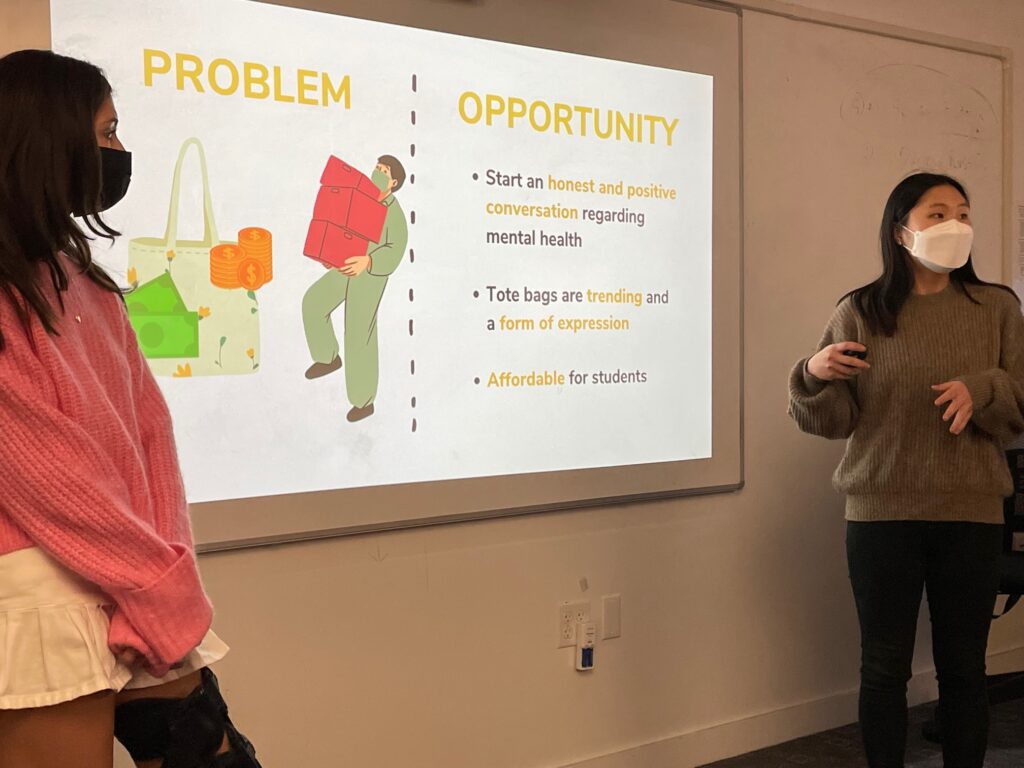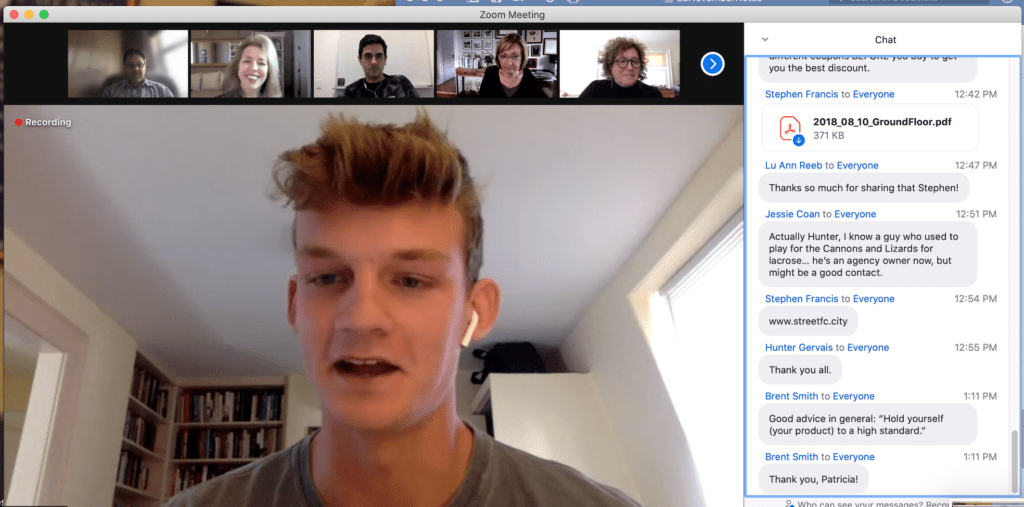Adventures in E3: Students Pivot from Team Challenge to Individual Projects
This is the second of several articles following two students through the Emerson Experience in Entrepreneurship program, better known as E3. Read the first article on Emerson Today.
Entrepreneurship moves fast.
E3ers Bo Feekins ‘22 and Sunjin Chang ‘23 are riding that wave after successfully captaining their teams in the Emerson Experience in Entrepreneurship program’s annual $10 challenge. They then quickly pivoted to focus on their individual business ventures, which they’ll unveil at the end of next semester.
$10 Challenge Challenges

Chang’s team’s project, Emotional Baggage, had the highest final net revenue of the four teams in the class. As captain, Chang spearheaded two significant collaborative decisions.
Calculations showed they were charging too little for their product, and she quickly gathered the team to discuss upping the price by $1. They decided to raise the cost of their bags.
Secondly, they had a popup shop scheduled for the last day of the challenge, but were sold out of product, so she called a team meeting to discuss whether the team should restock. After discussing the pros and cons of investing more money and time for the popup, they decided to restock, and they sold out on the last day.
“It was a big risky move, because it was the last week of sales, and we only had one more day to sell,” said Chang. “If we restocked and didn’t sell it, we’d lose money.”

Chang also dealt with one or two unplanned surprises that can hit businesses.
“We actually got robbed. A student came in and took a bag, didn’t pay, and left,” said Chang. “It hit me hard, because I was at the popup station. Financially, it didn’t hurt us a lot. Emotionally, it didn’t feel good.”
The experience also illuminated to Chang the importance of balancing consumer mindset and a business frame of mind.
“I was able to learn more about marketing: what works for people, and how to set up a marketing plan that fits the right customer market,” said Chang.
E3 Director Lu Ann Reeb said Emotional Baggage was an extremely creative business name, and couldn’t have been more perfect for the tote bag they sold. In her written feedback, Reeb discussed the team’s decision to restock.
“I’m glad you did restock and sell out. I think your late start to launch at the beginning of the project was your biggest obstacle,” said Reeb. “If you had started selling sooner, I think your revenue would have grown faster.”
Like Chang, Feekins’ experience as a team captain taught him the need to be flexible, and when something needs to be addressed, the leader is often the one to get it done.
“As the leader, it’s your responsibility to go and solve those issues and let everyone else thrive at what they’re good at,” said Feekins.
Feekins’ team’s business was Port-a-Plant, which sold small succulents. It taught Feekins the vitalness of planning and taking care of small details when starting a business.
“Basically, 90 percent of the work [that] is required goes into it before you even sell your first product,” said Feekins. “We bought our product and were ready to launch, but in reality, we needed a lot more planning to launch, and a lot more strategy.”
Reeb said the Port-a-Plant team was successful due to their thoroughness, creativity, tenacity, and recognizing goals early on. She acknowledged the team faced some bumps, but attained its goals, which is part of the entrepreneurial experience.
“The sustainability embedded in both an environmental angle and a well-being angle served you well as integral to your value proposition,” said Reeb. “It was interesting that the door-to-door sales turned out to not be the best approach, as you thought it might – evidence of how assumptions often can surprise the entrepreneur.”
There’s No I In Team, But There Is in Individual (Businesses)
After the $10 challenge, E3 students needed to pivot their focus to their individual business ventures. In a speed-pitching virtual session, students gave one-minute presentations to a panel of entrepreneurs, faculty, and staff.
The panel included E3 graduate Evy Chen ’10 – whose E3 project became Evy Tea, a cold brew tea company sold at hundreds of locations across the country; Jessie Coan, MA ’10 of Jessie Coan Marketing; Marketing Department Chair Dr. Brent Smith; Emerson Launch Director Sanjay Pothen; Business of Creative Enterprises Director Wes Jackson; Emerson Trustee Patricia Peyton ’84, managing director of Sphere International and director of Companies in Motion; and affiliated faculty members Bhamati Viswanathan and Stephen Francis.
Panelists provided spontaneous feedback to students.
Chang gave a well-rehearsed pitch for her venture, tentatively called Seed. Her idea is for a subscription-based business-to-consumer service that would provide an immersive network of personal and professional development resources to students. Seed sprouted from her seeing a lot of students being asked to delve into the professional world without the necessary skills.
“When was the last time you were asked, ‘What do you want to be when you grow up?’” Chang began.
Panelists complimented Chang on her pitch, using words like smooth, well-practiced, fantastic, and energetic.
Chen wanted to hear more about why the business matters to Chang. “Everything is personal,” Chen said. “Nothing is more important than connecting [for others] ‘This is why this is important to me.’”
Pothen suggested Chang provide an example of making the user experience real, and as a possible investor, he was left pondering what Chang wanted. “Lead with what’s the ask,” Pothen said. “Are you asking me to invest?”
“I was unsure of my business model,” said Chang afterwards. “I wasn’t feeling the best pitching it to the panel. But the panel liked my energy and would’ve invested in my energy. That really boosted my confidence.”
Chang saw that much depends upon an entrepreneur’s palpable passion.
“If I can show my interest in this — even if my business model isn’t in a perfect position — if I can bring energy and passion to the table, people can see that and they will lend out a hand and hopefully invest financially,” said Chang.
Bo Knows Football

“My question is: What happens to footballers who don’t make it?” pitched Feekins, and by footballers, he’s talking about soccer. “Are they prepared for life after football?”
A huge selling point of a good entrepreneurial venture is that it meets a need, and Feekins said there is no organization that helps international athletes become students in the U.S. Feekins said his unnamed venture would host soccer clinics in Europe for college athlete recruiters, similar to the camps that occur in the U.S.
Feekins drew on his own personal experience as a high school athlete in Europe. He envisions camps in Germany, Spain, and beyond.
Pothen said Feekins’ opening question in his pitch drew him in, and said the company could expand to other sports.
“I get the need. The need is there,” said Pothen. “How are we actually going to do this? Would you be working with these footballers on applications for colleges? They’re presumably your customers.”
Panelist and entrepreneur Stephen Francis, who is also Feekins’ professor, said he’s working on a similar idea and wants to talk more with Feekins about the idea outside of the pitch session. Francis said the majority of athletes up to age 22 don’t go pro, and are losing time to go college.
“The idea is that college coaches would kill to get these players to play in the U.S.,” said Francis. “It’s almost a recruiting business. You’re offering college prep services to these athletes. On the opposite end, you’re creating a database of soccer players in the world.”
Peyton said she could put Feekins in touch with the first person to get a PhD in the field of student-athlete success.
“It’s interesting how you will be aligning with colleges’ and universities’ decision makers and influencers. How will you make money and who will pay you?” asked Peyton.
Like Chang, Feekins felt encouraged by the panels’ feedback. Days after the pitch, Feekins had connected with Peyton.
“In your own head you say, ‘This is a good idea, and this is going to work,’ and when other people nod their heads and see what you’re doing, I was super pleased with how it went,” said Feekins.
Feekins said the biggest thing he took away from the panel was the need to connect with people who are already trying to find athletes: college coaches, people who run camps, recruiters, and international student athletes.
Consider and Analyze Feedback
After the pitch sessions, E3ers had several days to contemplate panelists’ observations.
Reeb talked about assessing the feedback. She stressed that the students presented very, very early pitches to get comfortable with articulating their ideas.
“The feedback from our external guests is invaluable at this stage, because they don’t know anything about each of the student’s ideas, and that’s on purpose,” said Reeb.
The class participates in a thorough reflection session the Monday after the pitch session to discuss what the feedback means to each student.
“I instruct students to realize that they do not have to take literally the feedback that they feel is not relevant to their business venture,” said Reeb. “As an entrepreneur, you need to be a good listener to all perspectives and then decide for yourself as the ‘owner’ of your idea. Sometimes, they don’t know that’s an option, but it is!”
Categories